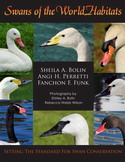Ask the Swan Specialist
Date: 22 January 2011
Hi Jennifer:
Unfortunately, this is the way that many states are reacting toward a lot of "non-indigenous" species. The promotion of indigenous species at the expense of an introduced species is not going to stop unless the public gets involved. Yes, there are many invasive species such as the boa constrictors, anacondas, etc., that truly do not belong. These types of exotic animals have caused so many problems that many states in order to prevent them from being introduced are now
taking the opportunity to include all kinds of species including pelicans, cardinals, cormmorants, swans, etc.
Where were the governmental controls when these non-native exotic species were introduced? Maybe, due to permit fee, etc. the states turned their heads as they added to their coffers. Now, because federal government interests (i.e., grants and other funding) are now geared toward some of the endangered species, etc., state commissions now suddenly see the need to get rid of of the non-native species to receive this new funding. Again, all of this is about money, not about saving any species.
In some cases, these non-native species such as Mute swans were brought over at the time that the U.S. was settled. At the same time, there are actual studies showing that Mute Swans were always indigenous to North America as they fly the migratory pattern from Alaska through Canada and to Washington State. Some stayed and naturally migrated to other U.S. states and formed colonies. However, once again to suit whatever needs someone may have to cull or stop certain species, this point is overlooked and the Mute Swan is considered a "threat" to a habitat.
Take the case of the alligator and the Bald Eagle. The U.S. and various states worked to bring back these creatures from the brink of destruction and a lot of federal money was expended and received. Now, because these species have made an incredible comeback, they have been taken off of the endangered list and placed on the protected list. Still, there are individuals and entities which have successfully demanded an open or hunting season to reduce their numbers because they don't want the creatures in their back yards or to encroach on their fishing interests. So, now we have hunting season on alligators (because there is money to be made on hunting licenses, etc.) and a move to kill or reduce the number of bald eagles.
At what price do taxpayers continue to support the protection of species only to land up killing them as their numbers increase because someone states that they now are over burdening a habitat?
If this is the case, at what price are we going to spend money and manpower to kill off any non-native species to protect an endangered species that will eventually be culled once the endangered species overruns the
habitat?
Yes, it is time for taxpayers to understand that many exotic species are dangerous to the general public, but how dangerous is a Mute Swan to the public? Some state that the mute swan is encroaching on habitats that Trumpeter Swans (native swans) need for nesting, food resources, etc. Has anyone ever seen a fight between a Trumpeter and a Mute Swan? Needless to say, the Mute swan usually does not get to stay in the same territory if it is not severely injured or killed. So, where is the threat?
Studies (both pro and con) have been conducted to ascertain if the Mute Swan is the main culprit for eating and destroying native lemon grasses in Maryland. Each side shows that mute swans either cause the destruction or do not. However, one cause that has never truly been discussed is the possibility that run-off from pig farms may actually be the culprit. Why are these studies not being considered?
If one honestly sits back and asks whether the money to cull various species is truly cost effective and not just a means to receive other types of funding, then the taxpayer certainly has a valid case to demand their state fish & wildlife commissions stop wasting their money for this never ending cycle of non-indigenous vs native species. The Regal Swan
Messages In This Thread
- Killing of our male swan on Omena Lake, MI -- Queenie -- 7 July 2010
- Re: Killing of our male swan on Omena Lake, MI -- Jennifer -- 22 January 2011
- Re: Killing of our male swan on Omena Lake, MI -- The Regal Swan -- 22 January 2011
- Re: Killing of our male swan on Omena Lake, MI -- The Regal Swan -- 8 July 2010
- Re: Killing of our male swan on Omena Lake, MI -- Jennifer -- 22 January 2011
Ask the Swan Specialist is powered by
Tetra-WebBBS 5.30 Beta © 2006-2007 Tetra-Team






